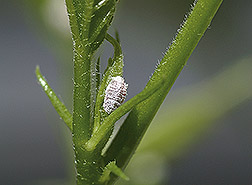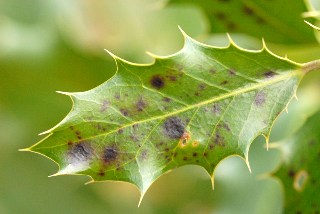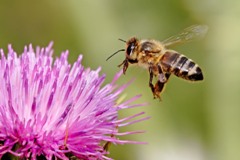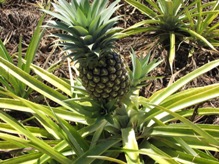Interactions
You might think that
pineapples are just plants and don’t interact with others much
(except for certain rectangular shaped sponges under the sea),
however there are many interactions that occur between pineapples
and many other species. Mealy bugs:
Dysmicoccus brevipes
and
Dysmicococcus neobrevipes are up to no good when found around
pineapple plants. They cause the disease mealy bug wilt and is
transmitted by virus or a phototoxin from the bugs. Plants that are
affected by the mealy bugs are stunted and turn yellow then red
(these are also symptoms of drought).
These water molds cause
severe root and heart rot in the pineapple plant. They are often
found in areas that have poorly drained soil, high rainfall and soil
with a pH of 5.5. Nematodes: When pineapple is grown on
the same land for a long time, nematodes can become a problem for
pineapple plant growth. The nematodes feed on the roots of the
plant, and can cause 1/3 of the crop to be lost. Insects: Many in Humans: Most of us have at least seen
a pineapple fruit and many have tasted it. It is very common a Sustainability: Pineapple farming has its economic advantages in
Costa Rica, it also can cause many environmental problems.
Environmentally, if not done properly, pineapple farming can cause
soil deterioration, erosion, deforestation, and can contaminate
water supplies. Even with these problems, producers work hard to earn
the Rainforest Alliance Certified TM seal, which shows that they
make an effort to farm sustainably and meets the Sustainable
Agricultural Network (SAN) standards. For smaller pineapple farms,
there is an incentive program that helps them financially if they
farm sustainably. So as long is pineapples are grown properly, they
can be a very sustainable food source. Now that it seems you know everything you wanted to about
pineapples, check out some fun facts here,
or return to the home page here.
 Phytophthora cinammomi and
Phytophthora parasitica
Phytophthora cinammomi and
Phytophthora parasitica sects can help or hurt
the plant. Helping the plant are pineapple beetles and honeybees are
used for pollination. Some insects that can hurt the plant are the
black maize beetle, white grub, ants, thrips, and many more. These
all affect various parts of the plant including the roots, stems,
leaves, fruit, and flower.
sects can help or hurt
the plant. Helping the plant are pineapple beetles and honeybees are
used for pollination. Some insects that can hurt the plant are the
black maize beetle, white grub, ants, thrips, and many more. These
all affect various parts of the plant including the roots, stems,
leaves, fruit, and flower. nd
quite delicious if I do say so myself. They are very good for us
too. Pineapples are an excellent source of Vitamin C, which helps
improve the immune system in individuals who consume it. It is best
to consume fresh pineapple as opposed to canned, for canned reduces
the amount of Vitamin C by three times. Fresh pineapple also
contains an abundance of Manganese, which helps strengthen bones.
Pineapples also contain the digestive enzyme bromelian, which is an
anti-inflammatory that encourages healing for injuries.
nd
quite delicious if I do say so myself. They are very good for us
too. Pineapples are an excellent source of Vitamin C, which helps
improve the immune system in individuals who consume it. It is best
to consume fresh pineapple as opposed to canned, for canned reduces
the amount of Vitamin C by three times. Fresh pineapple also
contains an abundance of Manganese, which helps strengthen bones.
Pineapples also contain the digestive enzyme bromelian, which is an
anti-inflammatory that encourages healing for injuries.
